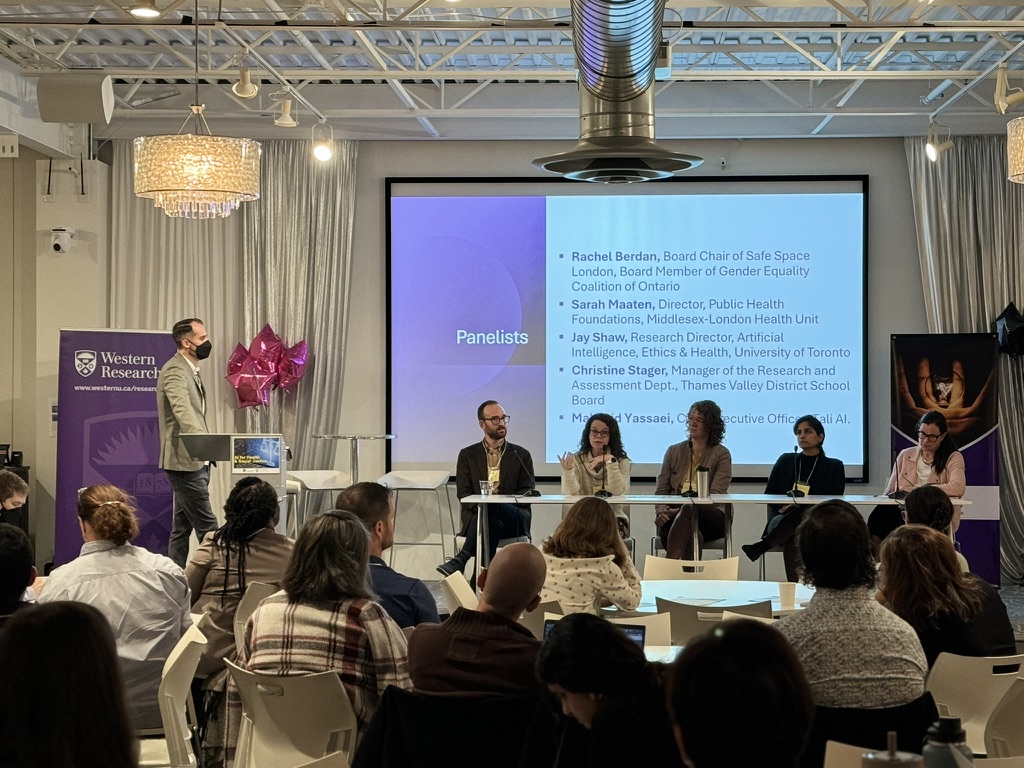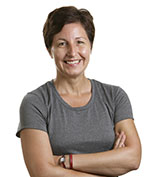The power of multi-sector collaboration to support positive use of AI for health and social justice was evident at the RECAP Event
Artificial intelligence (AI) shows immense promise for improving public health and social justice, but to reach its potential, AI must be harnessed in a positive way. AI ethics is a hot topic! Discussions are needed to expand the ethical use of AI beyond health care to public health and to overcome concerns and challenges that prevent us from embracing AI as a tool to advance social justice.
Fueling discussions, leveraging diverse perspectives, and building relationships among experts from multiple sectors was the primary goal of the research engagement event co-hosted by the Research Engagement Collaborative Alliance with Partners (RECAP) and the Western Rotman Institute of Philosophy supported by a Western Strategic Priority Fund. Over 60 people convened in downtown London including leaders from community, industry, and healthcare organizations, . Together they exchanged important knowledge from the perspective of social sciences, philosophy, business, technology, education, engineering, computer science, social services, health care, and public health.
To inspire conversations, co-chairs Maxwell Smith, Associate Professor, School of Health Studies and Dan Lizotte, Associate Professor, Departments of Computer Science and Epidemiology and Biostatistics started off the day by highlighting examples of AI tools currently in use to achieve various goals and by inviting panelists from different sectors to reflect on how they interact with AI in their work.
Non-academic and academic experts then took the lead by participating in breakout groups focused on the relevance of AI in their sector, the strengths and gaps that exists for them, and their vision of how partnerships could be developed to pursue meaningful opportunities. Important thoughts were raised related to literacy in AI, privacy, technology, trust, and power dynamics, along with the skills and knowledge needed to navigate the tools, their application, and related implications. From ethical frameworks to policies, funding and infrastructure, one of the main takeaways is that there is much to learn and the connections made during the event are a strong step in the right direction to pursuing AI opportunities that would benefit public health and social justice in a positive way.
NEXT STEPS?
Immediate next steps to be led by the Rotman institute include:
- Setting up opportunities for more interactions among external partners and researchers to explore research ideas and opportunities for collaborations aligned to Rotman areas of focus
- Creating connections with other units on campus to improve access to AI educational materials, information on AI tools, or other non-research specific resources related to AI
- Exploring how Rotman can contribute to the development of a community of practice
To learn more about the Rotman institute’s next steps, to tell us about initiatives you are leading, or to express your interest in engaging with our researchers, please connect with our team at rotman.institute@uwo.ca.
UPCOMING EVENT:
RECAP’s next community engagement event will be co-hosted with the Institute for Earth and Space Exploration in February 2025. Once again, the RECAP team will bring together non-academic and academic experts to build connections and explore Earth Observations of Vegetation.
To learn about the next research engagement events, please subscribe to RECAP’s mailing list.
Comments from participants on what they enjoyed most about attending the event:
“People across sectors talking about what’s interesting or challenging for them. It was cool to see what we had in common and what we could learn from each other.” (Research Partner)
“I appreciated hearing people from other sectors who had similar concerns to my own because knowing that people have similar considerations, I’m more apt to trust that we can have a meaningful relationship.” (Research Partner)
“Meeting other community members and research partners helped build connections for this problem of practice and many others as well!!!!” (Research Partner)
“The best parts of the event for me were learning about the different organizations in London that are interested in partnering with Western researchers on this topic and showing potential partners what research at Western could offer to them.” (Carolyn McLeod)
Pictured above: Panelists from diverse sectors briefly sharing with the audience different viewpoints and perspectives related to the event theme.


